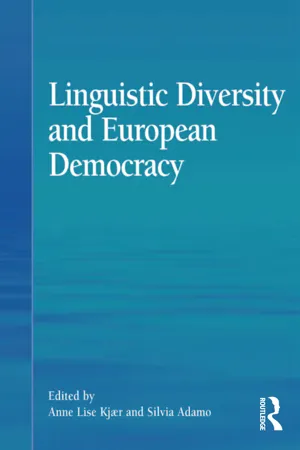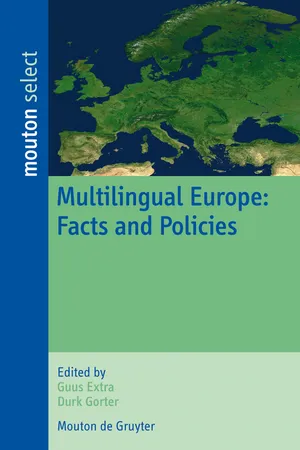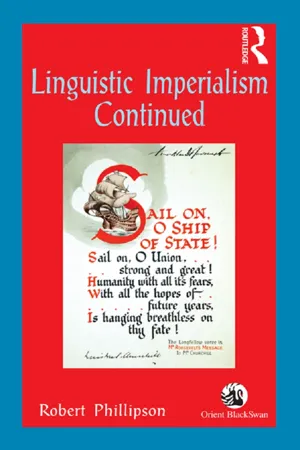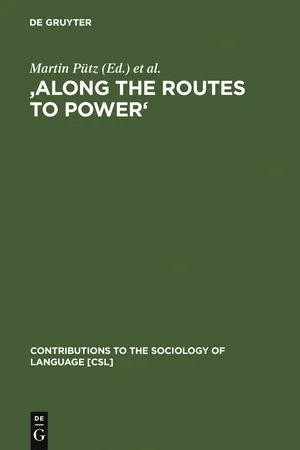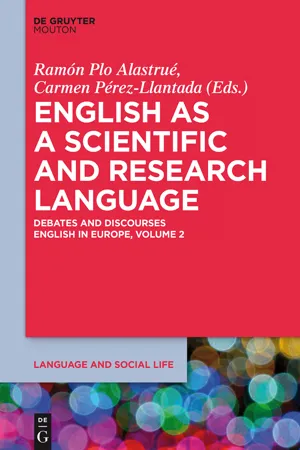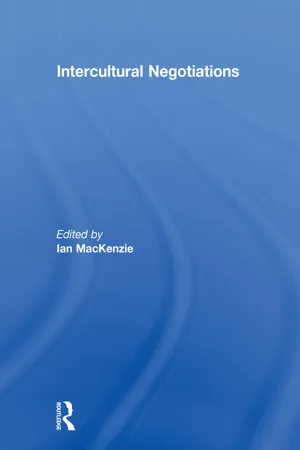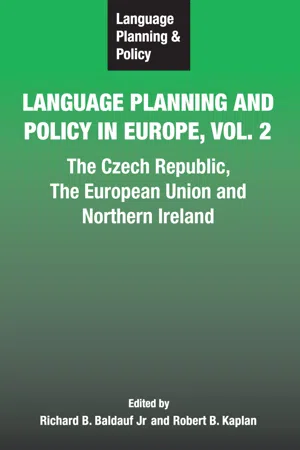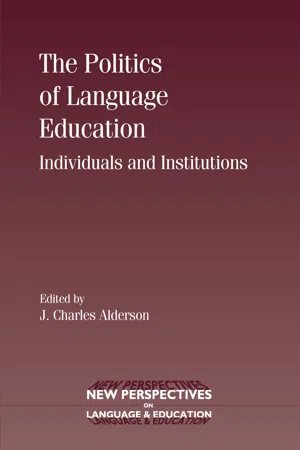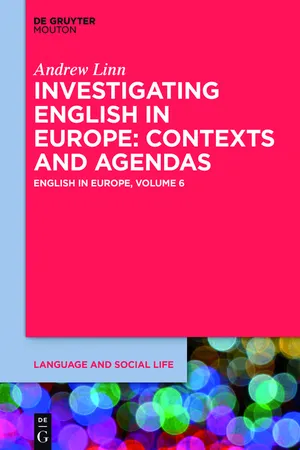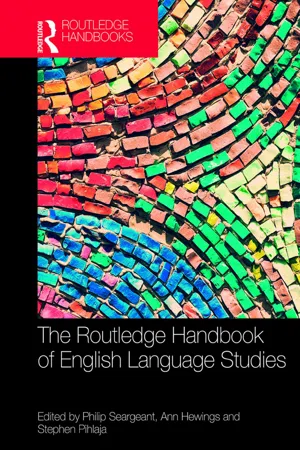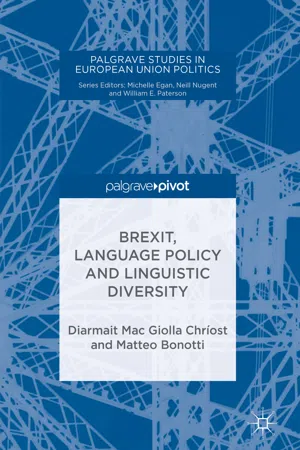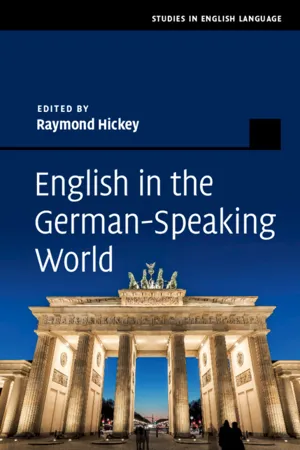Languages & Linguistics
English in Eu
"English in EU" refers to the use and status of the English language within the European Union. It encompasses the role of English as a working language of the EU institutions, its impact on multilingualism and language policies, and its influence on communication and language learning within the EU member states. The presence of English in the EU reflects the broader global significance of the language.
Written by Perlego with AI-assistance
Related key terms
1 of 5
12 Key excerpts on "English in Eu"
- eBook - ePub
- Anne Lise Kjær, Silvia Adamo(Authors)
- 2016(Publication Date)
- Routledge(Publisher)
the English language as project, as process and as product (Phillipson 2009a). Nobody is questioning whether English ought to be optimally learned or not. There is no dispute about the fact that proficiency in English is massively useful in the modern world, and that English serves multiple purposes, some constructive, some benign and some evil. But while English opens doors for some, it closes them for others. This is the case in Europe, just as it is on other continents.The 2008 Communication on Multilingualism refers to an EP Resolution which goes beyond European languages in Europe.27 It acknowledges “the strategic importance of European World Languages as a communication vehicle and as a means of solidarity, cooperation, and economic investment”. The EP recommended that this concept should be “one of the main political guidelines of European policy on multilingualism”. The Commission therefore states in the Communication (page 14) that it will:• develop partnerships and enhance cooperation on multilingualism with non-EU countries, taking account of the opportunities offered by those European languages which have a worldwide coverage • promote the teaching and learning of all EU languages abroad. The Member States are invited to: • further enhance networking and cooperation among relevant institutes to better promote EU languages abroad.The “institutes” referred to are presumably the bodies concerned with the promotion worldwide of English (British Council), French (Francophonie agencies), German (Goethe Institut), Spanish (Instituto Cervantes) and, to a lesser extent, other languages. Hitherto such promotional activities have been exclusively a national priority which, in the case of France and the UK, has been of major national and economic importance. But it is false to state that cooperation between these national concerns can be “further enhanced” when there exists virtually no such cooperation.28 - eBook - PDF
Multilingual Europe
Facts and Policies
- Guus Extra, Durk Gorter, Guus Extra, Durk Gorter(Authors)
- 2008(Publication Date)
- De Gruyter Mouton(Publisher)
English as lingua franca in Europe today Juliane House In this chapter, I will first briefly describe the language policy of the Euro-pean Union (EU) as a framework for considerations of the role of English as a lingua franca in Europe today. Secondly, I will clarify the term Eng-lish as a lingua franca (ELF). Thirdly, I will discuss the claim that ELF is a serious threat to multilingual communication and multilingualism in the world and in Europe from four perspectives, i.e., the socio-political, the linguistic, the psycholinguistic and the pedagogic perspective. Finally, I will draw some conclusions from this discussion. 1. Language policy in the European Union In the Charter of Fundamental Rights the EU declares that it respects lin-guistic diversity, and that linguistic diversity is a fundamental value of the EU. Despite this commitment, there is no common European language policy because language policy is understood to be the responsibility of the European member-states. The member-states are however supported in their decisions on language policy by many EU institutions which explic-itly encourage all their citizens to become multilingual and follow the so-called “M+2” principle (Europeans should master two other languages over and above their mother tongue). In support of this ideal, the EU has insti-tuted a number of programs (Lingua, Erasmus, Socrates, etc.) to promote diversity, mobility, multilingualism and multiculturalism – all of them mainstays of the (unofficial) European language policy. There are at present 23 official languages in the European Union (with immigrant languages being ignored) and all languages in the EU can also function as working or procedural languages, i.e., as languages that have legal status in the EU as a supra-national organisation and thus function as a legitimate means of communication. - eBook - ePub
- Robert Phillipson(Author)
- 2013(Publication Date)
- Routledge(Publisher)
EU treaties and proclamations decree support for multilingualism, and cultural and linguistic diversity, but in practice EU treaties are weak on language rights, there is laissez faire in the linguistic market, and political paralysis afficts language policy analysis and formation at the supranational level (Phillipson 2003). There is formal equality between 23 official languages, but in the internal affairs of the EU institutions, French was earlier primus inter pares and English is the current lingua cucula. The advance of English can be seen clearly in the figures for the language used in the initial drafting of EU texts, which show a significant and accelerating shift from French to English over time (see table below). Table 1. EU texts: Initial drafting language, 1970–2006, percentages. When English is used so extensively, confirming its dominance in many domains, this serves to make the learning of English more attractive than learning other languages. The UK has a vested interest in promoting this trend, and the increased influence that follows with it, as well as economic benefits. ‘The English language teaching sector directly earns nearly £1.3 billion for the UK in invisible exports and our other education related exports earn up to £10 billion a year more’, writes Lord Kinnock in a Foreword to David Graddol’s book English Next (2006), commissioned by the British Council. This declares itself on www.britishcouncil.org as ‘[t]he United Kingdom’s international organization for cultural relations and educational opportunities.’ Though it is largely government-funded, the British Council relies on the teaching and examining of English worldwide as a major source of revenue. It is also a pillar of the British government’s cultural diplomacy strategy worldwide - eBook - PDF
'Along the Routes to Power'
Explorations of Empowerment through Language
- Martin Pütz, Joshua A. Fishman, JoAnne Neff-van Aertselaer, Martin Pütz, Joshua A. Fishman, JoAnne Neff-van Aertselaer(Authors)
- 2011(Publication Date)
- De Gruyter Mouton(Publisher)
The dominance of languages and language communities in the European Union (EU) and the consequences 1 Ulrich Ammon 1. The public discourse of multilingualism and the growing predominance of English The public discourse of EU politicians on language policy stresses the need to maintain all the languages, at least the indigenous languages of the EU as part of the community's cultural wealth and as an essential component of European identity. As a corollary, general individual multilingualism is stipulated to guarantee communication between EU citizens, ideally the knowledge of three languages: mother tongue + two foreign languages. Such views were presented over and again, for example during the Euro-pean Year of Languages in 2001. The EU's linguistic reality appears to be different, in that its perhaps most striking feature is the ever greater predominance of just one language, English. This fact is often felt to be in conspicuous contrast with the EU's language-policy objectives. However, at close view the predominance of English and multilingualism are at least partially compatible. They could for instance coincide, in the long run, in the following overall EU language situation: 1. on the societal level, (a) a monoglossia for the English-speaking countries, (b) a diglossia for other linguistic majorities or for linguistic minori-ties in the English-speaking countries: national language/ minor-ity language + English, (c) a triglossia for linguistic minorities outside the English-speaking countries: minority language + national language + English, (with English always the highest language 1 ,highest in diglossia ter-minology) plus, in all three cases, the additional use of a number 218 Ulrich Ammon ber of other foreign languages for special purposes or in special domains. - eBook - ePub
English as a Scientific and Research Language
Debates and Discourses
- Ramón Plo Alastrué, Carmen Pérez-Llantada, Ramón Plo Alastrué, Carmen Pérez-Llantada(Authors)
- 2015(Publication Date)
- De Gruyter Mouton(Publisher)
Kachru (1997) who used three circles to denote the historical and sociolinguistic profile of English in different parts of the world. The inner circle refers to the countries where English is used as the first language: UK, USA, Ireland, Canada, New Zealand and Australia. In countries belonging to the outer circle English is not used as the first language by the majority of the population but it is used as a second language at the institutional level in former colonies. In the expanding circle English has no official status but it is taught as a foreign language in schools.In the European Union English is the most popular foreign language. According to the Eurobarometer, 38 % citizens of EU declare that they can carry out the conversation in English, whereas only 14% of EU citizens have considerable knowledge of German and 14% of French. Two basic varieties of English are used in a contemporary Europe: English in its native variety and English performing the role of a contemporary Lingua Franca. The native form is used in Great Britain, Ireland, Gibraltar and Malta. English as a lingua franca is used in Europe as an important medium of communication in science, education, business, technology, diplomacy and in international transactions.The majority of university students learning English in non-English-speaking countries (in the expanding circle) use English more often with other non-native speakers than with native speakers of English. Thus, they use English as a Lingua Franca (ELF). The motives for using English in academic settings include pedagogical, pragmatic, and commercial reasons (cf. Coleman 2006 ). The adoption of English as a lingua franca in an academic context raises cultural awareness of students and academic staff, enhances the prestige of higher institutions, facilitates success in research and raises the possibilities of employability of graduates (cf. Coleman 2006 ). The privileged role of English language in an academic context has contributed to the so called “Englishization” of higher education:Institutional and individual self-interest thus coincide both for academic staff, whose international careers depend on a demonstrated ability to teach and publish in English, and for students whose access to a good employment track on graduation also depends heavily on their proficiency in English. Employability of graduates is, in turn, a common criterion of university rankings (Coleman 2006 - eBook - ePub
- Ian MacKenzie(Author)
- 2013(Publication Date)
- Routledge(Publisher)
2 will continue to resemble the English used in the British Isles. This essay considers the place of English in Europe. Can it be the means of expression of European identities, or is it necessarily and constitutively the bearer of ‘Anglo-Saxon’ values? And is there an already existing or emergent variety of English that could be called English as a lingua franca, or ELF, that could be codified and taught?English is widely used for international communication in business, finance, science and technology, international relations, diplomacy and military missions, higher education and research, sport, design and fashion, all forms of mass media, the entertainment industry, and travel and tourism. In some of these domain-specific uses, English as an international language (EIL) closely resembles English as a native language (ENL), generally the British or American varieties. In other domains, where English is used as a second language or a language of wider communication (LWC), or a lingua franca for intra-European communication, including the expression of feelings and identities, there is some evidence of an emergent variety that might be called (Euro-)ELF. Margie Berns (1995: 4) has suggested that the use of English in the multicultural and multilingual area of Continental Europe is not unlike its use in India: an LWC among a wide range of speech communities, languages and dialects, which could result in an established variety. Before discussing European English, however, I will consider the use of English in science and technology.Scientific English
The advantages of having a common language for publishing scientific results are obvious, and today that common language is undoubtedly English. As Josiane Hay (2008) has shown, scientists have long needed, and used, a common language. In the 16th and 17th centuries, Agricola, Copernicus, Kepler, Newton, Tycho Brahe and others all wrote in Latin, and Latin translations, such as those of von Hohenheim/Paracelsus and Ramée/Ramus, often had much greater success than the originals. At the time of the Inquisition, publishing abroad, and in Latin, was often a matter of prudence as well as a way of reaching an international audience. By the 19th century, scientists across Europe were publishing and speaking at conferences in various vernacular languages, which led to calls to establish an international auxiliary language for science. Given the difficulty of classical Latin, a common idea was a simplified version with no declensions, inflexions or exceptions, and of course with a lot of neologisms. Fifteen different models of a new Latin were published between 1883 and 1912, including Peano’s Latino sine flexione . Another logical suggestion was to use a simplified version of a single, major language, namely English, German or French, but there was resistance in both Britain and France to the use of a simplified, standardized version, which, it was feared, would diminish the quality of writing. The third solution was to develop a simple and rational artificial language, based on Indo-European roots, which would allow a perfect match between language and thought, and foster understanding and communication. This, it was argued, would be the fairest, most democratic solution, as it would be no one’s mother tongue. No fewer than 116 such languages were developed between 1880 and 1914, including notably Volapük, Esperanto and Ido. At the behest of the International Association of Scientific Academies, the Delegation for the Adoption of an International Auxiliary Language was hugely active in the first decade of the last century, holding hundreds of conferences, before finally settling on Ido, a reformed version of Esperanto, but the whole enterprise was muted by the First World War (see Couturat and Leau, 1903; 1907; Eco, 1995: chapter 16). Charles Ogden’s BASIC (standing for British American Scientific International Commercial) had many enthusiastic proponents in the 1930s, but was not widely adopted.3 - eBook - PDF
Language Planning and Policy in Europe Vol. 2
The Czech Republic, The European Union and Northern Ireland
- Richard B Baldauf Jr, Robert B Kaplan, Richard B Baldauf Jr, Robert B Kaplan(Authors)
- 2005(Publication Date)
- Multilingual Matters(Publisher)
There are also other important languages in the world, and, at least for the time being, their share in global communication will sooner increase than decrease (Graddol, 1997: 3). In the EU, communication is of course not limited to the EU institutions. The individual member states are responsible for the policy on language use outside the institutions. Neither the current position of English as a working language in the EU, nor a possible monopoly as such in the future can guarantee that all communications between and within the member states will take place in English. In this respect I have already mentioned the language use in the admin-istrative system of a number of Euregions. However, many people, politicians among them, are of the opinion that such communication should also be conducted exclusively in English. Let me repeat what I have so often stated with regard to the Dutch situation: it is absolutely not true that, within Europe, the foreign language needs in industry, diplomacy and social intercourse between citizens in general are fully covered by merely learning English (see, e.g., van Els & van Hest, 1990; van Els, 1993; van Els, 1994a; van Els, 1994b). 20 This is of course especially true for the countries where the ‘minor’ languages are spoken, but nonetheless also for countries speaking the ‘major’ languages, even Great Britain (see, e.g. Hagen, 1994). In order to develop a sound policy on foreign language teaching, it is neces-sary to catalogue the actual needs of the country and the citizens; making vague general statements on the importance of teaching foreign languages is not enough. This is what the EU tends to do, usually also stressing that all officially recognised languages of the EU should be taught, as if many citizens in the EU would benefit from learning Dutch, and as if it is a crying shame that the majority of the citizens choose not to do so, whatever the EU may say. - eBook - PDF
The Politics of Language Education
Individuals and Institutions
- Charles Alderson(Author)
- 2009(Publication Date)
- Multilingual Matters(Publisher)
The Guide deals with the main issues at stake in language policy in Europe: the approach (the Council of Europe clearly advocates plurilin-gualism), the ideologies – linguistic and political – behind language policy, and the ‘problem’ of English – a language which in reality dominates lan-guage policy agendas in European member states. The Guide also provides terminological definitions, suggestions and recommendations for imple-mentation of language policies and references to important texts in the field of European language policy. However, the Guide states that it does not ‘advocate any particular language education policy measure’ (Beacco & Byram, 2003: 7) and the main aim of the document is to present a point of reference for the shaping of policies for language education, establish-ing goals and identifying the technical means of implementing them. The caution of the Council of Europe and the multi-faceted perspectives of the proposals in the Guide stand in stark contrast to the main results of the May 2006 Council of the European Union, as reported in the Press Release, which ‘invites Member States to take all necessary steps to carry forward the process of establishing the EILC (European Indicator of Language Competence)’, 1 a rather tall order for member states. The European Union Language Educational Policies Within a European Framework 213 thus takes a very different stance from the Council of Europe, most probably because of the nature of the institution itself, which is accountable to the agreements of its summits and the mandates of its ministers for action. European proposals have very important implications at the national level. Each country in Europe has to integrate them into their own national policies, shifting from a traditional compartmentalisation of subjects towards the transversality of key competencies 2 where languages play a major role. - eBook - PDF
Investigating English in Europe
Contexts and Agendas
- Andrew Linn(Author)
- 2016(Publication Date)
- De Gruyter Mouton(Publisher)
It is necessary, therefore, to circumscribe the set of relevant documents and to define from which perspective such documents should be discussed. Group 2 is probably the most interesting because it contains the general orientations of the language policy of the EU. We focus on two specific areas, that is, the economy and society. They correspond to points 2b and 2c in the list above. As noted by Grin, Marác, Pokorn and Kraus (2014), EU language policy aims at contributing to the achievement of two EU socio-economic objectives that are difficult to reconcile, i.e. promoting 4 For a comprehensive overview of EU actions and initiatives in the field of multilingualism, see Cullen et al . (2008), European Commission (2008c), European Commission (2011). 140 Changing practices and policies intra-EU mobility ⁵ and at the same time ensuring inclusion and social cohesion .⁶ The next section illustrates the heart of the matter. 4.3.2.1 The context of EU language policy During the last decades the official EU discourse about foreign (or second) lan-guage learning and teaching has been increasingly connected to the achievement of the general socio-economic objectives of the EU (Krzyżanowski and Wodak 2011). Such objectives were defined in the Lisbon Agenda 2000–2010 and in the Europe 2020 Agenda .⁷ The EU does not however seek to neglect the cultural or cognitive aspects of language learning; quite simply, the scope of EU language policy has been broadened. Languages are increasingly viewed as skills that can contribute to economic growth, competitiveness, mobility of labour, and employ-ability. This change has gradually become evident in different official documents. - Philip Seargeant, Ann Hewings, Stephen Pihlaja, Philip Seargeant, Ann Hewings, Stephen Pihlaja(Authors)
- 2018(Publication Date)
- Routledge(Publisher)
The wider educational potential of ELS as set out above is not that well understood in both HE and society in general. As a contributing strand to subject English in UK HE, ‘brand recognition’ of ELS is fuzzy and disciplinary networks are dispersed. English Language may be invisible as a label within English departments, or it may be allied to education, languages, communication, media or (applied) linguistics. This is in contrast to its position as a school subject in the UK where it has gained greater recognition with the advent of English Language as a choice for ‘A’ level examinations. The syllabus specification indicates that school students are expected to cover, for example, diverse methods of analysis – phonetics, phonology and prosodics, graphology, lexis and semantics, pragmatics, and discourse – and use them to understand language, the individual and society (Assessment and Qualifications Alliance; (AQA) 2014). Specifically, within the AQA syllabus, students study language diversity and variety with the aim of understanding how and why language varies because of ‘personal, social and geographical contexts’ (p.14), and through this to develop their critical knowledge and understanding of different views and explanations. The previous iteration of this syllabus (AQA 2013) tied the knowledge and understandings more closely to developing a critical perspective on communication and specifically referenced critical discourse analysis (CDA). While school students base understandings of a subject on what they are taught, which is largely circumscribed by examination syllabi, within HE the discipline area is often harder to demarcate. In 2010 a group of academics in the UK attempted to rectify this situation by producing an English language benchmark statement under the auspices of the Higher Education Academy (HEA), the English Subject Centre and the Language and Area Studies Subject Centre (HEA 2011). The benchmark statement aimed to help teachers advising on the choice of university courses, academics introducing or reviewing a degree in English language, and employers wishing to understand the qualification obtained by a job applicant with a degree in English Language. The defining principles were set out as follows:Students study the linguistic systems underlying English, as well as language in use and the relationship between language and context, the society and the individual. They typically study both written and spoken language, with multimodal texts also a focus on some programmes. English may be studied in its cultural, contemporary and historical background; it may be related to literary texts, everyday discourse, and the structure of languages other than English. Descriptive analysis will be combined with more critical and theoretical work which develops students’ understanding of texts and/or language systems.(p.3)Despite this effort, it is often difficult to find ELS on UK HE websites, to know what label to search for it under, or what university faculty or department to search for it within. For example, in the online subject information within The Complete University Guide (2016), ELS is invisible and ‘English’ is largely synonymous with English literature. However, one of the videos on the site in which students talk about their experiences of studying English features a person who was actually a student of Linguistics. This lack of clarity and visibility serves to obscure the potential and reach of the subject on its own and in combination with others.ELS in non-UK university contextsThe situation in other English-dominant countries is somewhat different as ELS is not a recognised subject label, although elements of it may be embedded within the curriculum. In the USA, English as a designation in HE is mostly synonymous with literature; however, rhetoric and composition classes have kept a language focus that has had a history in university education since the 19th century (Russell 2016). Aspects of ELS are mostly distributed among other disciplines such as Linguistics and Education. Writing from within a US tradition English (2012), in his book looking at futures for English Studies, begins his discussion by conflating English with literature, but later expands from a US focus to a global examination of English which includes English as a foreign language, creative writing and cultural studies. The (in)visibility of ELS in HE qualifications continues in Australasia, where English is again mostly associated with the study of literature written in English, and in both Australia and New Zealand aspects of English language study are likely to be found in other schools and departments such as Linguistics or Arts and Media.- eBook - ePub
- Diarmait Mac Giolla Chríost, Matteo Bonotti(Authors)
- 2018(Publication Date)
- Palgrave Pivot(Publisher)
1 . The first concerns the internal working of the EU’s institutions; the second concerns the communication between the EU and its citizens; and, finally, the third more informal level concerns the public sphere of the EU, where citizens have the chance to exchange ideas through various forums such as newspapers, TV, radio, and the Internet, and to enjoy opportunities for work and study in each of the EU member states. Discussions of English as a lingua franca are relevant to all three levels.Third, some authors have argued that under present conditions, the EU’s move from the current regime of official multilingualism to an oligarchic or even monolingual official language regime, where only a few languages or only one language, for example, would be employed by the EU in communications with its citizens, would both be ineffective and disenfranchise the vast majority of EU citizens (especially among lower social strata), preventing them from being able to access key information about EU legislation (e.g. Gazzola 2014 , 2016 ). This is especially the case in view of increasing population mobility and of the emergence of new linguistic minorities across the EU (Gazzola 2016 , pp. 9–10; see also Gazzola 2014 , pp. 239–240), minorities whose members may not have any knowledge of the language(s) to which an oligarchic or monolingual EU language regime would grant official recognition. However, this empirical literature per se does not and cannot provide any arguments for or against the promotion of English as a lingua franca in the EU. All it can show is that, as things currently stand , knowledge of English among EU citizens is not as widespread and as good as Van Parijs and others suggest or assume. This implies that if someone is normatively committed to official multilingualism, they will welcome the fact that only an official multilingualism regime can minimize and almost eliminate linguistic disenfranchisement. If, however, one is normatively committed to promoting English as a lingua franca in the EU, because of the aforementioned advantages that, according to some authors, having a lingua franca brings, one should demand that both the EU and its member states actively promote the learning of English among their citizens, thus also reducing the level of linguistic disenfranchisement - eBook - PDF
- Raymond Hickey(Author)
- 2019(Publication Date)
- Cambridge University Press(Publisher)
According to the Standard Eurobarometer (), % of EU respondents identify themselves as nationals of their country only, % as nationals first and European second, % as European first and national second, and % as only European. Concerning the emergence of a common Euro-English, Gnutzmann et al. () found that even univer- sity students with a relatively strong European identity and positive attitudes towards Europe did not think a common variety of English could or should be connected to European identity, and van den Doel and Quené () show that speakers across Europe continue to follow the exonormative standards of native speakers. Instead of treating ‘Europe’ as one sociolinguistic community, therefore, what follows will distinguish between individual European countries, as befits the focus of the present volume, but also in recognition of the vast differences between the countries as they already emerged in the analysis of Europe as a whole (Mollin ), and as they will again emerge in the following analysis. Recently, in a position paper on the possible linguistic consequences of The Status of English Brexit, Modiano () has proposed that English has become an L for the whole of Europe and that a lack of British native speakers on the EU level will speed up a process of the development of a Euro-English variety, but both claims are rejected by most of the scholars responding to the paper, most relevantly Gerritsen () and Schneider (), with Gerritsen () explicitly pointing out the vast intra-European differ- ences in terms of competence in and use of English. In Kachru’s original conception of the three-circle model, Europe was clearly seen to fall into the Expanding Circle of regions in which English is learned as a foreign language – one of the examples that Kachru (: ) mentions for this circle is Greece.
Index pages curate the most relevant extracts from our library of academic textbooks. They’ve been created using an in-house natural language model (NLM), each adding context and meaning to key research topics.
